Travelling by road from Bruxelles to Berlin, your vehicle enters Deutschland through the Belgian border along the state of Nordrhein-Westfalen, Germany's manufacturing heartland, dense with heavy industry and the wrack of a 19th century coal industry. Here are the cities of Dusseldorf, Essen, Koln, Wuppertal, Dortmund, Duisburg and of course Bonn, the former capital. Then comes the state of Niedersachsen and the important exhibition city of Hannover. Less populated thereafter is the state of Sachsen-Anhalt, in which broods the medieval city of Magdeburg. Then comes Brandenburg, once upon a time seat of the Hohenzollerns and the core of the powerful and feared Prussian empire of central Europa. Prussia attained its greatest importance in the 18th and 19th centuries, notably as a European power under the reign of Frederick the Great. Just outside Potsdam, you turn north towards Berlin and the thick woods of pine that line both sides of the autobahn veil the economic might of the capital that lies ahead.
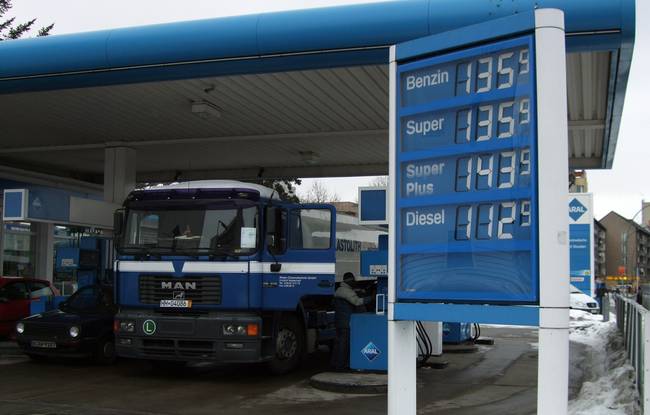
Petrol station in Berlin
The landscape in both Niedersachsen and Sachsen-Anhalt, from rolling pasture at the edge of the autobahn till the horizon, is often broken by ranks of wind turbines, their giant blades and rotors towering above small hamlets and grain silos. They dominate the north German countryside, displacing the more familiar and very much older church steeples, which in comparison seem to have shrunk when viewed against the vast smooth cylinders of curved steel that loft high the massive turbines. During the quick dusk of north Europa's summer, the navigation beacons mounted on the turbines blink staccato red, as the wind towers seem to converse with each other in optical code, perhaps exchanging arcane data about isobars and thermal differentials.
Germany devours energy of every sort and description. It has done so since the mid-19th century, when imperial Prussia sprawled contemptuous across northern Europa and plotted bigger things. The collection of principalities and kingdoms and dominions that came to be called Germany had seen themselves as victims of the European great powers, and imperial Prussia set out to unify them. To do so, it fought two wars. The first was in 1866 with the Hapsburg Empire, which Prussia defeated in seven weeks. The second war was in 1870-1871, when Prussia led a German coalition that defeated France. That provided Prussia the physical and economic space in which to create a modern, unified Germany. That unification (Germany's first) changed Europa dramatically. United Germany was economically dynamic, and its growth outstripped that of France and the United Kingdom. It was a naval power. It became a major exporting power, taking markets from Britain and France. Accomplishing all this took a lot of energy.
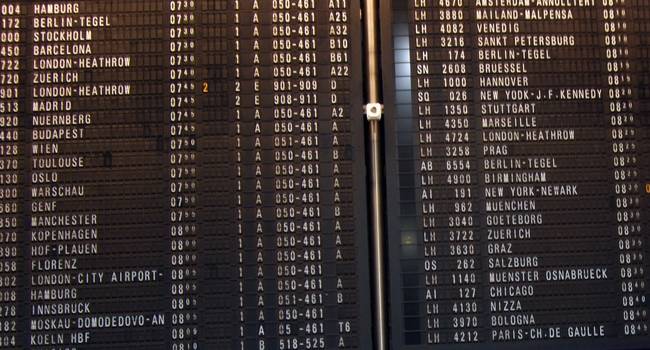
The giant flight display board at Frankfurt airport
"The history of energy is the history of technology," wrote the German Federal Ministry of Economics and Labour in 2005. "Although we speak of the coal age, the oil age and the solar age, these historical periods with their far-reaching economic and social upheavals would be inconceivable without the associated technologies. Without the invention of the steam engine by James Watt or the discovery of the dynamo by Werner von Siemens the coal age would never have existed. Without the development of the internal combustion engine mineral oil would not have begun its triumphant progress, now covering about 40% of global primary energy requirements. And without the basic development work on photovoltaics in the 1950s there would not be the present high hopes for a future solar age."
Contemporary Deutschland is intent on taking leadership of the age of renewables, it is looking for markets, it is using its very considerable technological capabilities, and it is looking east again. Promoting renewables has helped create a new industry in Germany. In 2008 around 278,000 people worked in the German renewables field. German know-how and technology on renewables are top exports, and are used worldwide to create electricity, heat and fuel from renewable sources. In 2007 the sector's export volume was around 9 billion euro. "The success of renewables promotion in Germany has been such that over 40 countries across the world have now adopted the EEG principles (Germany's Renewable Energies Act) and introduced feed-in tariffs. The Federal Government is lobbying its international partners to quickly increase their use of renewables, and supports relevant German firms in their international activities," explained the German foreign ministry, for which renewables is a favoured foreign policy tool.
That is why kanzlerin Angela Merkel was this month at the head of a delegation consisting of German industrialists (and politicians) to visit Russia, Kazakhstan and China. The delegation included the chairman of the German Federation of Trade Unions, Michael Sommer, and André Brie, a leader of the Left Party and member of the German Steering Committee of the Petersburg Dialogue Group, which was set up in 2001 by former Chancellor Gerhard Schröder and then-Russian President Vladimir Putin to promote German-Russian relations (Schröder left political office to work for a Russian energy company). The rulers of Deutschland are aggressive about defending - and extending - their export markets. Nearly half of Germany's gross domestic product (GDP) is exported. Developing relations with the growing, cash-rich regions of Asia is therefore a major task for German capitalism. In the course of its visit to China, the German delegation secured billions of euros in new contracts for leading German corporations: Daimler Benz, Siemens, BASF, Volkswagen, Eon and Airbus.
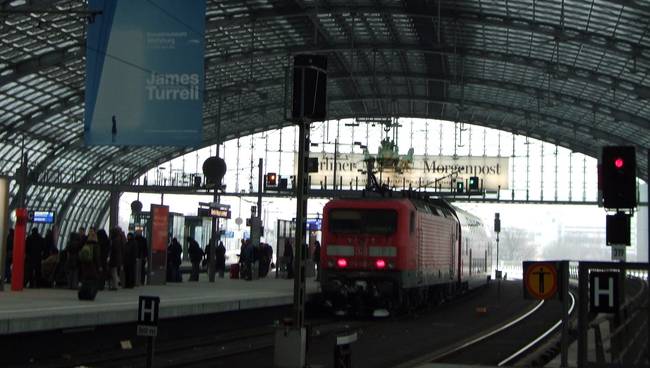
Hauptbahnhof, Berlin's main railway station
Merkel advised the rulers of China to further open its economy to German exports: "Chinese companies, like those of many other countries, enjoy very good access to the German market. We hope that German enterprises can enjoy the same access to the Chinese market," was her sales pitch. In recent months, there has been reason enough in capitalist logic to warrant the taking of such a position. The German news magazine Der Spiegel has cited the following facts: the French energy giant GDF Suez has acquired a 9% share in the Baltic Sea pipeline from the German corporations Wintershall and EON-Ruhrgas, and the French nuclear industry is clearly outstripping Germany's. While the Russian Agency for Atomic Energy (Rosatom) has just signed an agreement with the French company EDF, collaboration between Siemens and Rosatom was stagnating. (Read more on EB about Europe's pipelines in 'North Stream and the island of Gotland', by Kjell Aleklett)
Moreover, former Chancellor Schröder has attacked the Merkel government. In an article in the German newspaper Die Welt, he wrote that Russia was important for Germany and Europe for two reasons. First, Europeans needed "direct access to the huge Russian natural resources", and second, that "stability and security" could only be guaranteed in Europe through the "closest possible partnership with Russia". The increased focus on Russia is linked to specific economic interests and lucrative large-scale contracts. The German business press (Frankfurter Allgemeine Zeitung, Handelsblatt and Wirtschaftwoche) has described these major contracts and commercial interests in detail: the goal of the German companies is to win a large proportion of the contracts for updating ailing energy networks, restructuring inefficient industries and renovating old housing stock.
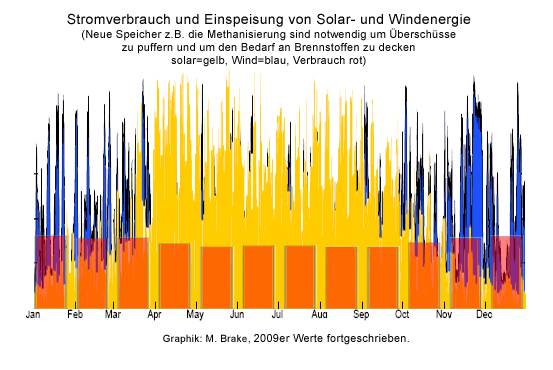
Electricity demand and availability of solar and wind energy, (Picture: Telepolis)
While pursuing economic realpolitik in the east, Germany's Ministry of the Environment (Umweltbundesamt) has just released a major study entitled 'Energieziel 2050: 100% Strom aus erneuerbaren Quellen' (Energy goal 2050: 100% Electricity from Renewable Sources) which is both an energy directive and a technological support to the foreign policy aims of the government in Berlin. "For Germany, the technological change towards an electricity supply system completely based on renewable energies by 2050 is possible. By doing so, Germany's status as a highly industrialised country can be maintained, as can its subsequent ways of living, patterns of consumption and behaviour."
"A switch to an electricity supply system based on renewable energies will also be economically beneficial. The costs of such a change in the energy supply are significantly lower than those of adapting to an unmitigated climate change we and future generations would have to otherwise face. Germany could link a respective strategy to a successful economic development whilst creating important momentum for current international climate negotiations. 70% of the current primary energy consumption in Germany is based on the import of coal, natural gas or uranium. A complete supply of electricity from renewable energies could therefore dramatically reduce Germany's dependency on such imports and decrease vulnerability to fluctuating or rising oil and gas prices. The conversion of the electricity supply system towards the use of 100% renewable energies by 2050 is possible. Nevertheless, this is a very ambitious goal and requires decisive political support."
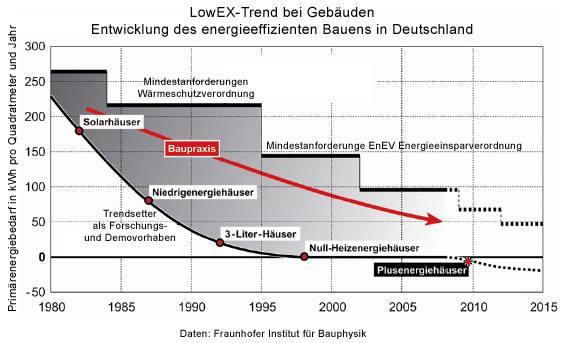
Development of energy efficient building in Germany, (Picture: Telepolis)
The Energieziel 2050 document is a telling example of how Deutschland's renewable energy leadership is firmly harnessed to its international economic objectives, its European leadership (look again at the climate negotiations statement) and its dominance (together with China) as a global exports leader. Nor is East the only direction in which Germany is looking. The German renewable energy agency Dena (Deutsche Energie Agentur GmBH) says that "German companies are well positioned to begin entering the lucrative US market for renewable energies and energy efficiency. Energy efficiency and renewable energy are key industries for the 21st century. German companies have much to offer in these fields and therefore have good chances in the US market. Additionally, the US government is furthering the development of clean technologies". The planned synergy between Germany's Ministry of Foreign Affairs, the Ministry of Economics and Labour and the Ministry of Environment is what is rather unoriginally called a "level playing field needed to create a 100% renewable electricity supply system by 2050". What is remarkable is that they are talking about achieving this globally, by first achieving this at home. "Aside from the regional scenario, we also sketch two other scenarios: international large scale application of technology and local energy autarchy," says the Energieziel 2050 document.
For the German renewables technology mission masters however, aiming for the clean energy high ground at a global scale is rather different from the view from the ground at home, in the streets of Berlin's suburbs and its middle-class housing enclaves, where a steadily ageing population is struggling more with every passing year to make ends meet. The Energieziel 2050 document speaks of Deutschland being able to "achieve an 80-90% reduction in greenhouse gas (GHG) emissions by 2050" for which "we will first have to transform our electricity supply system". The Umweltbundesamt said: "As an important condition for achieving this 100% renewable electricity supply, we have to tap the existing energy saving potential at the same time. This applies not only to the energy use of private households. Despite the expected economic growth, industry, trade and commerce also have to reduce their energy consumption by achieving the existing energy saving potential. If this is the case, renewable energies can provide the substantial additional electricity demand from new applications like electric cars or heat pumps for heating and hot water." (Read more on EB in 'Renewables & efficiency - July 16')
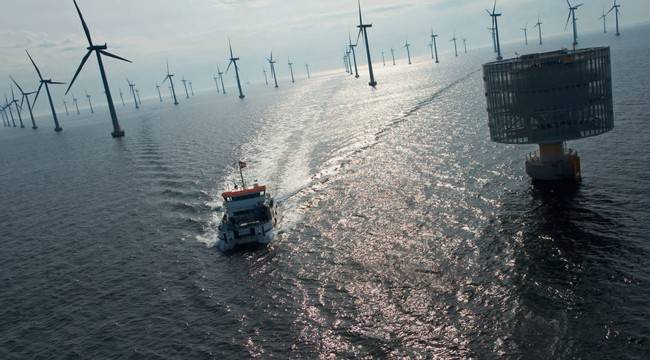
Offshore wind farm in Lillgrund, Sweden (Picture: Siemens AG, Energy Sector)
There's no doubt about the provenance of such an approach. The energy sector in Deutschland currently causes more than 80% of the emissions. Within this sector the electricity supply is responsible for about 40% of energy-related CO2 emissions. Government sees the potential for reducing emissions in the electricity sector as being very high. The share of renewable energies in the German gross electricity consumption has increased in the past 15 years from less then 5% to 16% in 2009. However, there is a great deal left to do if the planners of Berlin want to cover the country's demand for electricity in 2050 entirely through renewable energies. "It is not only necessary to accelerate the expansion of renewable energies but also to substantially convert the existing energy system to make it fit for an exclusive use of renewables in the future," says Energieziel 2050. "The earlier we start decisive actions the more time we will have to tackle the upcoming challenges of necessary technological and societal adaptation."
Well said, but how will it work? The three ministries, the kanzleramt (Merkel's sprawling Berlin office), the technocrats and the industrialists seem unable or unwilling to see the world through the eyes of Hans and Hilde, a typical couple either 65 and retired, or 25 and unemployed. Disembarking from my long haul bus at Berlin's Zentrale Omnibus Bahnhof, opposite the city's exhibition and exposition centre, I almost walked into a young man selling copies of Strassenfeger, Berlin's newspaper for (and by) the homeless. (There's another, called Motz.) Reading the latest issue, this is what I found.
The gap between rich and poor in Germany is widening, while the group of those on middle incomes is shrinking. This is the key finding reached in a new study by the German Institute of Economic Research (DIW) on income distribution in Germany. The DIW researchers regard their study mainly as a warning of the dangers this presents for social stability. The study clearly shows that for about 10 years the number of the poor has grown strongly, while the layer of wealthy citizens has increased steadily, although slowly. The poor become continually poorer, while the rich become even richer. (This is depressingly the same everywhere I have travelled in the last two years - South Africa, Western Europe, India, South-east Asia.) These two tendencies are at the expense of the middle-income stratum. "Some from this group have risen into the upper income group but many more have descended into the lower income group," the paper quoted from the study.
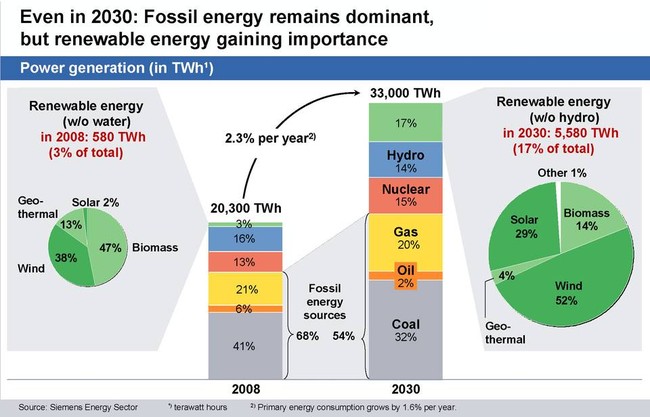
The energy mix in Germany (Picture: Siemens AG, Energy Sector)
The DIW economists and sociologists found that only 60% of Germans remain in the middle layer bracket with a monthly net income of €860-€1,844 (single households). In 2000, this figure was more than 66%. Above all, the number of those on low incomes has risen strongly, from 18% in 2000 to almost 22% in 2009. An even greater increase in this group is recorded in east Germany, from around 24% in 2000 to 31% last year. In 2000, those on low incomes received an average of €680 per month; in 2008 this was only €645. However, the median earnings of those in the higher income group have increased from €2,400 to €2,700 while the increase at the top of society is concentrated in only the richest 5% of the population.
This is in grey contrast to a rosy pronouncement by Der Spiegel in October 2009: "The technology of the future for smart energy management is going to be developed and tested, under the label E-Energy, in several cities. Tens of thousands of homes and hundreds of companies are expected to participate in the field tests. Research will be conducted into the possibility, for example, of homes that can largely produce all the electricity required by a household, as well as energy exchanges that enable consumers to sell any excess, self-produced and environmentally friendly electricity at a profit back to the energy grid." I can't imagine how my neighbour in a Berlin apartment block, 60 and moving into pension, will pay for all this with her €850 a month income, half of which will be used to pay rent for her small apartment. After paying the monthly rent and utilities, she will have about €450 left over, or €112 a week for food and transport. She has neither the spare cash nor the inclination to invest in 'smart energy management'. (Read more on EB about this in 'Planning for Europe's energy future', by Luis de Sousa)
As I have seen elsewhere in western Europe, the advanced liberal consumer democracies are ever more unable (politically unwilling) to implement genuine change. Deutschland's rulers in Berlin firmly believe that techno-managerial innovation (and a hefty dose of financial risk-taking) will continue to provide cures for current ideas of what is unsustainable. As has happened time and again in Europa's history of nations, from the mid-19th century onwards, the costs of such 'revolutions' will be externalised elsewhere (east and south), and the ecological sustainability that Germany's admirable network of communes have long been admired for will remain out of reach of the country's policy and practice. Swaddling themselves with the convenient 'win-win' sort of logic common to western socieities now, Germany's ruling coalition peddles tired values such as rationalisation, efficiency, competitiveness, acceleration, complexity and so on. In so doing, it depletes the socio-cultural resources that have long sustained the sturdy folk of Deutschland.
The true value of energy is the net energyJim Wright is Nashville Chamber’s Partnership 2010 co-chairman
No comments:
Post a Comment